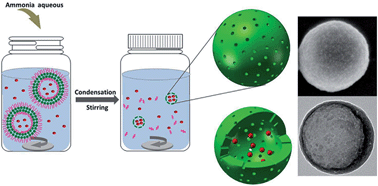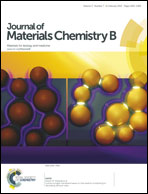Encapsulation of enzymes in silica nanocapsules formed by an amphiphilic precursor polymer in water
Abstract
In this work we report a fully aqueous and highly efficient method for the encapsulation of enzymes in silica nanocapsules during their formation process. In this approach, enzymes are first enclosed into unilamellar vesicles self-assembled by an amphiphilic precursor polymer – poly(ethylene glycol) substituted hyperbranched polyethoxysiloxane (PEG-PEOS) – in water. After subsequent condensation under basic conditions enzyme-loaded silica nanocapsules are obtained. Due to the significant volume shrinkage during the PEG-PEOS conversion, the encapsulation efficiency is very high, i.e. by adding only 5 wt% PEG-PEOS almost 50% of the enzyme from the solution is encapsulated. As compared with the free enzyme, the protease encapsulated by this means preserves almost 40% of its activity, exhibits significantly enhanced stability against the change of environmental conditions, and can be repeatedly regenerated without a significant activity loss.


 Please wait while we load your content...
Please wait while we load your content...